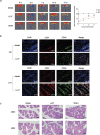LL37 promotes angiogenesis: a potential therapeutic strategy for lower limb ischemic diseases
- PMID: 40337519
- PMCID: PMC12055537
- DOI: 10.3389/fphar.2025.1587351
LL37 promotes angiogenesis: a potential therapeutic strategy for lower limb ischemic diseases
Abstract
Purpose: To study the angiogenic capacity of antimicrobial peptide LL37 (cathelicidin antimicrobial peptide), explore its molecular mechanisms, and provide new ideas for treating lower limb ischemic diseases.
Methods: LL37 was applied exogenously to human umbilical vein endothelial cells (HUVECs), and its effects on cell proliferation, migration, and angiogenesis were assessed using Cell Counting Kit-8 (CCK-8), plate cloning, scratch, and angiogenesis assays. A mouse lower limb ischemia model was established, with LL37 injected intramuscularly on days 0, 4, and 8. Blood flow recovery was evaluated by laser Doppler flowmetry. Immunofluorescence staining detected cluster of differentiation 31 (CD31) and cluster of differentiation 34 (CD34) expression, while Hematoxylin and Eosin (H&E) staining assessed muscle cell morphology. Quantitative real-time polymerase chain reaction (qRT-PCR) and Western blotting analyzed gene and protein expression changes in HUVECs.
Results: LL37 enhanced the proliferative, migratory, and pro-angiogenic abilities of HUVECs. It significantly improved blood flow recovery in ischemic limbs, with higher CD31/CD34 expression and more intact muscle morphology. qRT-PCR analysis demonstrated elevated expression of angiogenesis-related genes in LL37-treated HUVECs. Western blotting revealed increased vascular endothelial growth factor A (VEGFA) expression and enhanced phosphorylation levels of the phosphatidylinositol 3-kinase (PI3K)/protein kinase B (AKT)/mammalian target of rapamycin (mTOR) pathway in LL37-treated cells.
Conclusion: LL37 promotes angiogenesis via the VEGFA-PI3K/AKT/mTOR pathway, showing potential for treating lower limb ischemia by improving perfusion.
Keywords: LL37; VEGFA-PI3K/AKT/mTOR pathway; angiogenesis; antimicrobial peptide; lower limb ischemia.
Copyright © 2025 Yang, Wu, Wang, Mao, Zhang and Wu.
Conflict of interest statement
The authors declare that the research was conducted in the absence of any commercial or financial relationships that could be construed as a potential conflict of interest.
Figures




References
-
- Adamičková A., Chomaničová N., Gažová A., Maďarič J., Červenák Z., Valášková S., et al. (2023). Effect of atorvastatin on angiogenesis-related genes VEGF-A, HGF and IGF-1 and the modulation of PI3K/AKT/mTOR transcripts in bone-marrow-derived mesenchymal stem cells. Curr. Issues Mol. Biol. 45 (3), 2326–2337. 10.3390/cimb45030150 - DOI - PMC - PubMed
LinkOut - more resources
Full Text Sources
Miscellaneous

